2021 Humanist of the Year, Dr. Anthony S. Fauci
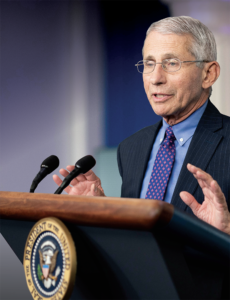 Dr. Anthony S. Fauci delivers remarks during a coronavirus update briefing on April 16, 2020 (Image: Andrea Hanks)
Dr. Anthony S. Fauci delivers remarks during a coronavirus update briefing on April 16, 2020 (Image: Andrea Hanks) The following is adapted from the presentation of the Humanist of the Year Award to Dr. Anthony Fauci at the American Humanist Association’s 80th Annual Conference in July 2021.
Introduction by AHA Board Member, Jennifer Kalmanson
I am pleased to present the 2021 Humanist of the Year Award to Dr. Anthony Fauci on behalf of the American Humanist Association (AHA). The award was established by the AHA in 1953 to recognize a person of national or international reputation who, through application of humanist values, has made a significant contribution to the improvement of the human condition.
Selection of the awardee is based on research derived from biographical data, writings, studies, and contributions to humanity. Nominations are accepted from AHA members and considered by the AHA Board Awards Committee. This is the highest honor that the AHA bestows.
The inaugural awardee was digestive physiologist Anton J. Carlson, who helped us understand how digestion works, which was previously a mystery. Other awardees have included founding UNESCO director Sir Julian Huxley, pediatrician Dr. Benjamin Spock, inventor and futurist R. Buckminster Fuller, feminist Betty Friedan, virologist Jonas Salk, Unitarian leader Edwin H. Wilson, nuclear physicist and Soviet dissident Andrei Sakharov, cosmologist Carl Sagan, author Isaac Asimov, economist John Kenneth, author Margaret Atwood, author Kurt Vonnegut, biologist Edward O. Wilson, former director of Amnesty International William F. Shulz, biologist Stephen Jay Gould, Rabbi Sherwin Wine, physicists Murray Gell-Mann, former U.S. Representative Pete Stark (the first federal elected official to publically call themselves a humanist), biologist and writer PZ Myers, science educator Bill Nye, feminist icon Gloria Steinem, former U.S. Senator Barney Frank, historian Jared Diamond, author Salman Rushdie, current US Representative Jared Huffman and now, immunologist Dr. Anthony Fauci.
So why does Dr. Fauci belong in such good company with this glowing list of luminaries?
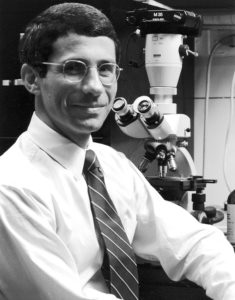
Dr. Anthony Fauci at NIAID in 1984
Since 1984, Dr. Fauci has served as the Director of the U.S. National Institute of Allergy and Infectious Diseases, a division of the National Institutes of Health. He has been a chief medical advisor to every President since the Reagan Administration. This man is America’s family doctor. Always prolific scientifically, he is known for his work fighting diseases such as HIV/AIDS (for which he was awarded the Presidential Medal of Freedom in 2008) SARS, MRSA, Swine Flu, H1N1, Ebola, and a host of immunodeficiency diseases. After the 9/11 attacks, he drove the push for bio-defense drugs and vaccines against potential bio-engineered threats.
His focus has always been centered on immunodeficiency. His scientific research is among the world’s most cited. He developed a deeper understanding of the human immune response and clearly laid out for the first time how immuno-suppressive agents adapt to our immune systems.
This new understanding, based on his work, saved the lives of people who otherwise would have died from immunodeficiency diseases. Specifically, Dr. Fauci’s research regarding HIV and AIDS allowed us to understand the basic disease progression. No disease like HIV/AIDS had had an impact on human health before. And so, understanding how HIV hijacks the body’s own immune system was key to understanding how HIV develops into AIDS, as well as being able to construct therapies for helping those infected with HIV survive longer and with better health.
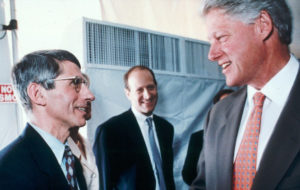
Dr. Anthony Fauci informs President Bill Clinton about advances in HIV/AIDS research in 1995. (Image: NIH)
Dr. Fauci has also worked towards developing a vaccine for HIV. Being HIV positive in the 1980s used to be a death sentence. Thanks to research by Dr. Fauci and teams around the world, that’s no longer the case.
But why grant him the award now?
Dr. Fauci’s work comes at a critical time for the American and global public health systems. During the COVID-19 pandemic, he has been fearlessly outspoken about the best information available at any given time, and he has been unafraid to deliver new information when our collective understanding of the disease, its impacts, and how to prevent infection has developed over time. In March of 2020, no one knew where COVID had come from, how it was transmitted, how infectious it could be, how often it might mutate or what public health measures might best contain it.
That March, everyone who could do so hid in our homes, sanitizing everything we touched, and avoiding human contact. Very, very few people were wearing masks. At the time, it was thought masks were a good defense against things like the flu. But since nobody knew how the coronavirus was transmitted, they seemed like an overly aggressive measure for very little benefit.
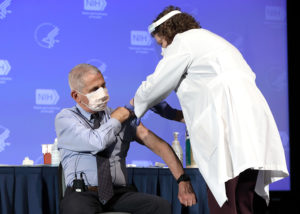
Dr. Fauci receives the Moderna COVID-19 vaccine at the HHS/NIH COVID-19 Vaccine Kick-Off event in December 2020. (Image: NIH)
That soon changed. As our understanding of the virus improved, it became clear that masks were very helpful in keeping airborne copies of the virus from lodging in our respiratory systems. Dr. Fauci did something quite radical then, considering the difficult culture of the Trump Administration in which he was serving: he changed the advice he gave to match the best available knowledge.
This is the essence of a scientific mindset and a humanist one. To be able to adapt our views and actions based on new understandings and new circumstances. If we are to survive as a species—if we are to overcome the many challenges facing us from this pandemic and the constant threat of new ones on the horizon, to developing a sustainable and just society, to the existential threats of climate change—we must all learn to adapt our thinking and our actions to the best available information.
For his enduring legacy as a scientist, as a healer and as a humanist, I’m honored to present to you our 2021 Humanist of the Year, Dr. Anthony Fauci.
2021 Humanist of the Year, Dr. Anthony S. Fauci
I am truly humbled to be in the company of the distinguished individuals who have received this award before me. This is such a wonderful honor, and with deep appreciation I accept the Humanist of the Year Award from the American Humanist Association.
As I have recounted often, several aspects of my upbringing greatly influenced the evolution of my career and the principles by which I live. These influences included my immigrant grandparents, who came to New York City from Italy and instilled in me a love for this country, a spirit of gratitude, and a desire to give back, which translated into my choice of public service as a career.
I come from a close family, and from a young age, I actually rode my bicycle to deliver prescriptions for my father, our Brooklyn neighborhood pharmacist, which actually taught me compassion for people whose suffering may be overlooked or unapparent. This awareness influenced my decision to become a physician.
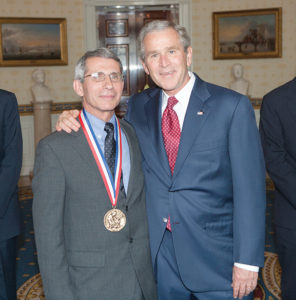
President George W. Bush awards Dr. Fauci the 2005 National Medal of Science. (Image: Eric Draper)
The Jesuit education that I had the good fortune to receive in high school and in college inspired my interest in philosophy and imparted important life principles. My outlook has since evolved to align with the concept of making the world a better place rather than being involved in any organized religion.
Yet, these Jesuit principles have been an invaluable guide for decades in my role as a public health official. Chief among these principles are staying faithful to the truth, even truths that may be inconvenient to some; communicating for understanding according to the adage precision of thought, and economy of expression; and pursuing social justice as well as service to others.
These principles, paired with my training as a physician and the pursuit and application of rigorous scientific research, are the cornerstones of my work ethic and have served me quite well when I was called upon to help lead the global public health response to emerging infectious diseases from AIDS to pandemic influenza to anthrax to Ebola to Zika and now to COVID-19.
I am fundamentally a realist, however, and with the emergence of COVID-19, I have found some things that have happened almost incomprehensible. Rather than uniting behind one strategy to defeat our common enemy, the coronavirus causing the COVID-19 pandemic, we find Americans have become more deeply divided against one another.
Doing something for the common good seems to have become a distant second to doing for oneself. Scientific integrity has been repeatedly denigrated. COVID-19 vaccinations have become political footballs as misinformation and lies about them abound.
Tragically, all this has happened while more than 600,000 Americans and more than four million people worldwide have died from COVID-19. Not only has this profoundly saddened me, this has made our objective to bring this pandemic to an end much more difficult.
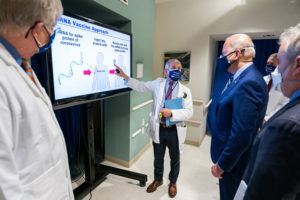
A coronavirus briefing with President Biden in February 2021. (Image: NIH)
Yet, against incredible odds, we also have successfully harnessed the talents of many millions, from scientists to healthcare workers to logisticians to community volunteers, to achieve extraordinary progress. Safe and highly effective COVID vaccines developed in record time are now available to anyone in this country aged 12 and older.
Nearly 68 percent of Americans 18 and older have received at least one shot of the vaccine. And this progress inspires us to persevere scientifically, firmly believing that science will continue to illuminate our understanding of this new illness and how to treat and prevent it, thus lighting our pathway out of this pandemic.
Importantly, we must focus not only on making safe and effective diagnostics, treatments and vaccines for COVID-19. We also have a moral imperative to ensure that they are delivered equitably to all who need them, here in this country, and around the world.
And so, my sincere thanks again for honoring me with this award. Please keep well.
